| Listing 1 - 10 of 17 | << page >> |
Sort by
|
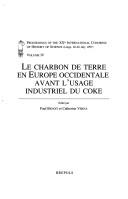
ISBN: 2503512682 Year: 2001 Volume: 51 9 14 Publisher: Turnhout Brepols
Abstract | Keywords | Export | Availability | Bookmark
 Loading...
Loading...Choose an application
- Reference Manager
- EndNote
- RefWorks (Direct export to RefWorks)
Science --- -Technology --- -Applied science --- Arts, Useful --- Science, Applied --- Useful arts --- Industrial arts --- Material culture --- Natural science --- Science of science --- Sciences --- History --- -History --- Technology --- Applied science --- Natural sciences
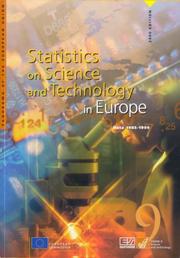
ISBN: 9289401761 Year: 2001 Publisher: Luxembourg : Office for Official Publications of the European Communities,
Abstract | Keywords | Export | Availability | Bookmark
 Loading...
Loading...Choose an application
- Reference Manager
- EndNote
- RefWorks (Direct export to RefWorks)
Technological innovations --- Innovations --- Statistics. --- Statistiques --- Science --- -Technology --- -Applied science --- Arts, Useful --- Science, Applied --- Useful arts --- Industrial arts --- Material culture --- Natural science --- Science of science --- Sciences --- -Science --- Technology --- Applied science --- Natural sciences
Periodical
ISSN: 18187803 Year: 2001 Publisher: Awka, Nigeria : Faculty of Engineering and Technology, Nnamdi Azikiwe University,
Abstract | Keywords | Export | Availability | Bookmark
 Loading...
Loading...Choose an application
- Reference Manager
- EndNote
- RefWorks (Direct export to RefWorks)
Engineering. --- Engineering --- Technology. --- Technology --- Applied science --- Arts, Useful --- Science, Applied --- Useful arts --- Construction --- Science --- Industrial arts --- Material culture
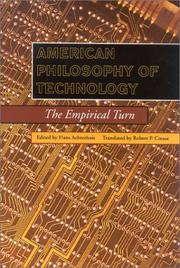
ISBN: 0253214491 0253339030 9780253214492 Year: 2001 Publisher: Bloomington (Ind.): Indiana university press,
Abstract | Keywords | Export | Availability | Bookmark
 Loading...
Loading...Choose an application
- Reference Manager
- EndNote
- RefWorks (Direct export to RefWorks)
Introduces contemporary American philosophy of technology through six of its leading figures. The six American philosophers of technology whose work is profiled in this clear and concise introduction to the field―Albert Borgmann, Hubert Dreyfus, Andrew Feenberg, Donna Haraway, Don Ihde, and Langdon Winner―represent a new, empirical direction in the philosophical study of technology that has developed mainly in North America. In place of the grand philosophical schemes of the classical generation of European philosophers of technology (including Martin Heidgger, Jacques Ellul, and Hans Jonas), the contemporary American generation addresses concrete technological practices and the co-evolution of technology and society in modern culture. Six Dutch philosophers associated with Twente University survey and critique the full scope and development of their American colleagues’ work, often illustrating shifts from earlier to more recent interests. Individual chapters focus on Borgmann’s engagement with technology and everyday life; Dreyfus’s work on the limits of artificial intelligence; Feenberg’s perspectives on the cultural and social possibilities opened by technologies; Haraway’s conception of the cyborg and its attendant blurring of boundaries; Ihde’s explorations of the place of technology in the lifeworld; and Winner’s fascination with the moral and political implications of modern technologies. American Philosophy of Technology offers an insightful and readable introduction to this new and distinctly American philosophical turn.
Technology --- Philosophy, American --- Technologie --- Philosophie américaine --- Philosophy. --- Philosophie --- -Applied science --- Arts, Useful --- Science, Applied --- Useful arts --- Science --- Industrial arts --- Material culture --- Philosophy --- -Philosophy --- Philosophie américaine --- Technology and civilization --- Technology - Philosophy.
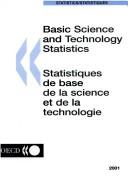
ISBN: 9264075496 9264097481 9789264075498 Year: 2001 Publisher: Paris, Cedex, France : OECD,
Abstract | Keywords | Export | Availability | Bookmark
 Loading...
Loading...Choose an application
- Reference Manager
- EndNote
- RefWorks (Direct export to RefWorks)
This publication provides recent basic statistics on the resources devoted to R&D in OECD countries. The statistical series are presented for the last seven years for which data are available and cover expenditure by source of funds and type of costs; personnel by occupation and/or level of qualification; both at the national level by performance sector, for enterprises by industry, and for higher education by field of science. The publication also provides information on the output of science and technology (S&T) activities relating to the technology balance of payments.
Science -- Statistics -- Databases. --- Science indicators -- Databases. --- Technology -- Statistics -- Databases. --- Science indicators --- Science --- Technology --- Statistics --- Applied science --- Arts, Useful --- Science, Applied --- Useful arts --- Industrial arts --- Material culture --- Natural science --- Science of science --- Sciences --- Indicators, Science --- Philosophy --- Social aspects --- Natural sciences
Periodical
Abstract | Keywords | Export | Availability | Bookmark
 Loading...
Loading...Choose an application
- Reference Manager
- EndNote
- RefWorks (Direct export to RefWorks)
Biology --- Biotechnology --- Biomedical Engineering --- Microbiology --- Bioengineering --- Biotechnologie --- Periodicals. --- Périodiques --- Biotechnology. --- Biomedical Engineering. --- Microbiology. --- Chemistry --- Engineering --- Biochemistry --- Civil Engineering --- engineering of biomolecules --- engineering metabolic pathways --- bioproduct engineering --- biosynthesis --- biotransformation --- bioreactors --- Bioengineering. --- Technology. --- Biological engineering --- Life science engineering --- Synthetic biology --- Arts, Industrial --- Industrial Arts --- Cloud Computing --- Technology --- Technologie. --- Applied science --- Arts, Useful --- Science, Applied --- Useful arts --- Science --- Industrial arts --- Material culture
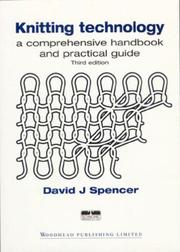
ISBN: 1855733331 1855737558 1280372079 1587161214 9786610372072 1591247608 9781591247609 9781855737556 9781855733336 9781587161216 Year: 2001 Publisher: Cambridge, England : Woodhead Publishing Limited,
Abstract | Keywords | Export | Availability | Bookmark
 Loading...
Loading...Choose an application
- Reference Manager
- EndNote
- RefWorks (Direct export to RefWorks)
The third edition of Knitting technology, widely recognised as the definitive text on the subject, has been thoroughly revised and updated to include all the latest developments. Beginning with the fundamental principles and moving on to more advanced aspects, it combines in a single comprehensive volume the basics of warp and weft knitting, fabric structures and products, the different types of machines, principles of production and terminology to provide an invaluable reference for textiles students, textile engineers and technicians involved in knitted garment design and manufacture.
Machine knitting. --- Knitting machines. --- Knitting. --- Technology. --- Techniques. --- Fancy work --- Applied science --- Arts, Useful --- Science, Applied --- Useful arts --- Science --- Industrial arts --- Material culture --- Knitters (Machinery) --- Textile machinery --- Machine knitting --- Knitting, Machine --- Knitting --- Knitting machines --- Technique. --- Tricotoses --- Punt de mitja --- Labors de punt --- Tricot --- Labors --- Gèneres de punt --- Màquines de tricotar --- Maquinària tèxtil --- Tècnica --- Maquinària

ISBN: 1281025879 9786611025878 008054519X 9780080545196 9781281025876 0121663558 9780121663551 Year: 2001 Publisher: San Diego, Calif. : Academic Press,
Abstract | Keywords | Export | Availability | Bookmark
 Loading...
Loading...Choose an application
- Reference Manager
- EndNote
- RefWorks (Direct export to RefWorks)
The ethical assessment of new technologies raises two principal concerns: the need to develop effective policies and legislation, and the reconsideration of the ethical frameworks in which these policies and laws are developed. The importance of rapid, accurate examinations of tensions between Philosophy and Law and the relationship between philosophical principles and empirical data has never been greater.The Concise Encyclopedia of Ethics of New Technologies includes 23 articles previously published in the highly-acclaimed Encyclopedia of Applied Ethics, nine updated articl
Biotechnology --- Medical genetics --- Technology --- Applied science --- Arts, Useful --- Science, Applied --- Useful arts --- Science --- Industrial arts --- Material culture --- Clinical genetics --- Diseases --- Heredity of disease --- Human genetics --- Medical sciences --- Pathology --- Genetic disorders --- Chemical engineering --- Genetic engineering --- Moral and ethical aspects --- Genetic aspects --- Biotechnologie --- Génétique médicale --- Technologie --- Encyclopedias --- Aspect moral --- Encyclopédies
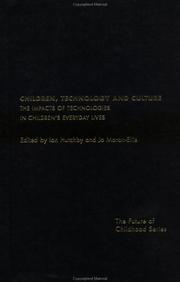
ISBN: 0415236347 0415236355 0415242436 0415242444 9780415236348 9780415236355 1136365443 1315011387 1136365370 9781315011387 9781136365379 9781136365447 9781136365515 Year: 2001 Publisher: London Routledge
Abstract | Keywords | Export | Availability | Bookmark
 Loading...
Loading...Choose an application
- Reference Manager
- EndNote
- RefWorks (Direct export to RefWorks)
The essays in this volume examine the interplay of children and technology, and address critical questions about how we understand the nature of childhood in a modern technocratic society.
Child labor --- Enfants --- Congresses --- Travail --- Congrès --- Technology and children --- Computers and children --- Information society --- Technologie et enfants --- Ordinateurs et enfants --- Société informatisée --- Technology. --- 193 Kinderrechten en Media --- Technology --- Arts, Industrial --- Industrial Arts --- Cloud Computing --- Applied science --- Arts, Useful --- Science, Applied --- Useful arts --- Science --- Industrial arts --- Material culture --- Study and teaching (Elementary) --- sociology. --- education. --- Sociale agogiek --- jeugdbescherming en kinderrechten --- jeugdbescherming en kinderrechten. --- Study and teaching (Elementary). --- Jeugdbescherming en kinderrechten. --- Congrès --- Société informatisée --- education --- sociology
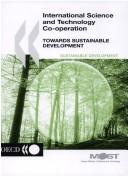
ISBN: 9264186352 9786610030880 1280030887 9264192344 Year: 2001 Publisher: Paris : OECD Publishing,
Abstract | Keywords | Export | Availability | Bookmark
 Loading...
Loading...Choose an application
- Reference Manager
- EndNote
- RefWorks (Direct export to RefWorks)
Achieving sustainable development goals at a global level will strongly depend on the rapid technological development and innovation, and the widespread diffusion and application, of cleaner technologies in non-OECD as well as OECD countries. But do the developing countries have the capacity and motivation to take advantage of cleaner technology options? What are their needs? And what are the barriers which must be addressed? Arresting the impending environmental imbalances and ecological instability and moving towards sustainable development call for establishing a new multilateral framework for co-operation in environmental science and technology.
Environmental protection --- -Science --- -Sustainable development --- Technology --- -520 Milieubeleid --- Duurzame ontwikkeling --- Development, Sustainable --- Ecologically sustainable development --- Economic development, Sustainable --- Economic sustainability --- ESD (Ecologically sustainable development) --- Smart growth --- Sustainable development --- Sustainable economic development --- Applied science --- Arts, Useful --- Science, Applied --- Useful arts --- Natural science --- Science of science --- Sciences --- Environmental quality management --- Protection of environment --- International cooperation --- Environmental aspects --- Environnement --- Développement durable --- Congresses --- Protection --- Coopération internationale --- Congrès --- Science --- 520 Milieubeleid
| Listing 1 - 10 of 17 | << page >> |
Sort by
|

 Search
Search Feedback
Feedback About UniCat
About UniCat  Help
Help News
News